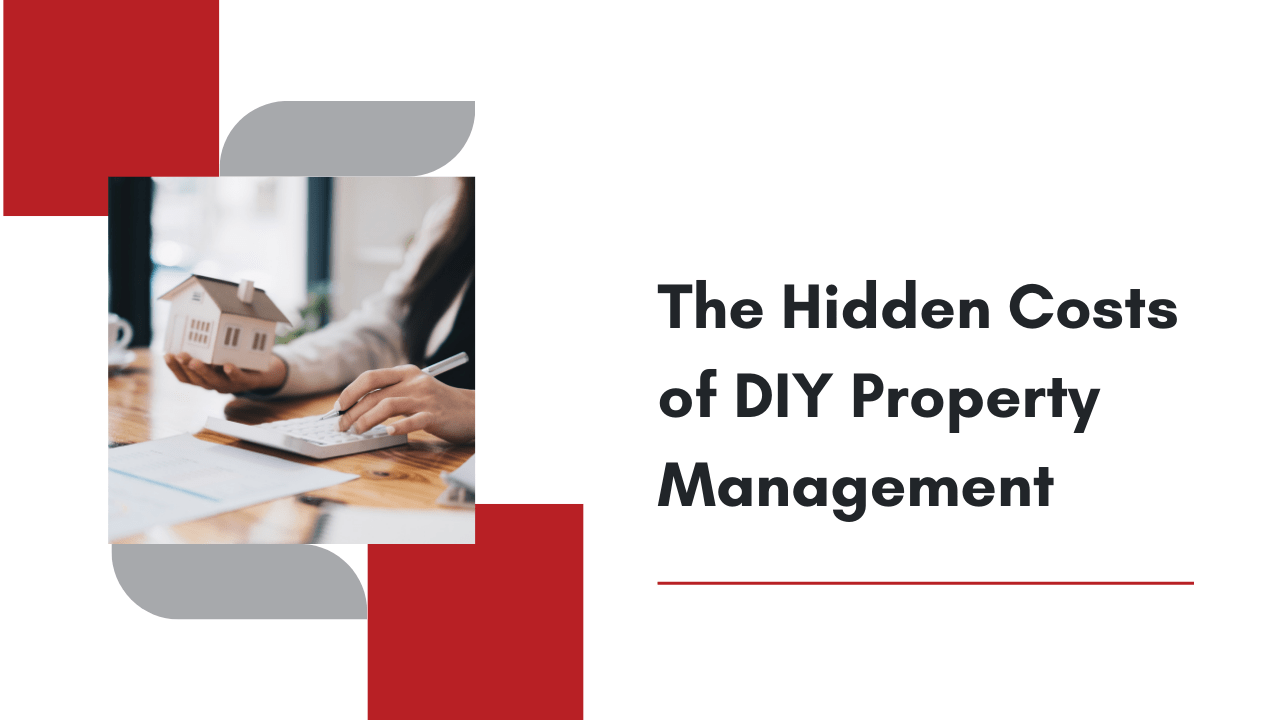Yes. When you partner with a professional property management company, you will have to pay a management fee. Usually, that fee is a percentage of the rent you’re earning. That’s likely to motivate your management company to keep rents as high as possible, without inviting a vacancy that’s too long and too expensive. And when you think about it, 10 percent or so of your monthly rent is a small price to pay for all of the support, systems, technology, and expertise that you’re getting in exchange for that fee.
The Hidden Costs of DIY Property Management

We understand all the reasons that investment property owners have for trying to manage their own rental properties. You likely expect to save money, since you won’t have a leasing fee to pay or a monthly management fee to budget into your fixed expenses. Perhaps you like the sense of control you have over details such as tenant selection, maintenance vendors, and lease renewals.
What you need to know, however, is that there are a number of hidden costs to DIY property management. You may not save the money that you think you’re saving. In fact, you may find yourself spending more than you would if you were willing to invest in a professional property management partnership.
There’s also the opportunity cost.
Property managers in Northern Virginia
have access to technology, tools, and resources that a lot of DIY owners simply cannot access on their own. We do more than collect rent and handle repairs; we also share our extensive knowledge of the rental market. We help you identify new opportunities to grow your investment portfolio. We protect you from risk and liability.
Let’s take a look at the hidden costs of managing your own property, and why it actually may be more cost-effective to hire an expert.
Tenant Quality: Screening and Retention
Tenant quality is something that every rental property owner needs to think about, especially when saving money and maximizing rental income is the goal. A
profitable rental experience requires a good tenant, and DIY owners do not necessarily have the screening capability that professional property managers do. Here are the hidden costs of a bad tenant:
- Potential for late rent payments or rent not coming in at all.
- Eviction.
- Lease violations.
- Conflict and disputes during the tenancy and even after the tenancy.
- Property damage exceeding the security deposit.
You don’t want to lose money by placing an unqualified renter. Property management partnerships save money by ensuring that only high-quality residents are approved to live in your property. We have extensive screening tools that look at everything from national eviction records to credit and criminal backgrounds. As professionals, we screen tenants on a daily basis; we know what the red flags look like and we know what a qualified application looks like. Don’t put your property or your profitability at risk by waving in a tenant who has not been thoroughly screened or who “seems” to be a good fit based on your gut or your instincts. You’ll lose money.
Screening tenants is only the first part of a positive tenancy. There’s also the retention of those tenants. Property managers work hard to prioritize tenant experiences, leading to higher tenant satisfaction and better earnings.
Self-management can lead to more tenant turnover. Unless you have the time, talents, and systems to focus on tenant retention, it’s possible you’ll lose your tenant at the end of every lease term. That means more money spent on the turnover process, more money lost on the vacancy, and extra time required to
market your property to new residents. There will be maintenance costs and aesthetic updates. Cleaning. Listings.
Property managers keep vacancy and turnover to a minimum, saving you money in the short-term and the long-term.
Hidden Maintenance Costs with Self-Management
If you have a
great team of preferred vendors
and contractors in place who are ready to meet every maintenance need, whether it’s an emergency leak in the middle of the night or a new roof that needs to be planned before the winter, great. You are well ahead of where most self-managing landlords find themselves. A lot of DIY owners struggle to find the maintenance services that they need, especially when there are emergencies that require a sense of urgency.
Self-managing landlords are also more likely to overpay for maintenance services. As property managers, we have the benefit of getting the most attractive pricing from the vendors and service providers we work with. That’s because we’re able to provide them with a significant volume of consistent work. Individual property owners cannot keep up with that, and therefore their pricing is a bit higher.
Working with a professional property manager, you’ll leverage these maintenance relationships and save money. You’ll also have a solid maintenance plan in place that protects the value and condition of your property.
- There’s less deferred maintenance to worry about.
- There are fewer expensive emergencies.
- Property managers partner with tenants to ensure that maintenance requests are made in a timely manner, so there’s no threat of unreported issues.
As property managers, we can provide an easy-to-use online portal where tenants can make maintenance requests electronically, at any time. They can provide detailed descriptions and even photos. This gives us an accurate record of work that was needed and an indication of how it was completed. It keeps the entire maintenance process efficient and cost-effective.
DIY managers spend more on maintenance than owners who partner with a professional management company. This is one of the best ways to leverage the relationship and to benefit from cost savings. You’ll also have a property that’s in better condition and more attractive to current and future residents.
Legal Mistakes and Liability
One of the hidden costs that a lot of DIY managers don’t think about until it’s too late is the expense of legal claims, lawsuits, and regulatory mistakes. Do you know how to lawfully evict a tenant? You cannot just show up and demand they leave. You cannot change the locks or turn off the water. There’s a process that includes a notice period, a court summons, and a valid judgment that ultimately delivers the property back into your possession. Trying to evict on your own can lead to a lot of legal trouble.
There are also strict rules and requirements around things like:
- Fair housing. Do you know the protected classes? A lot of self-managing landlords will use language in their marketing materials that can be perceived as discriminatory. You might not have a consistent screening process in place with documented rental criteria, which can get you into trouble. There’s a difference between a service animal and a support animal, and neither of those animals can be treated as pets. Fair housing violations can cost an owner more than $10,000. This is not a mistake you want to make.
- Security deposits. Virginia has some strict security deposit laws. You cannot charge more than the equivalent of two months’ rent, for example. When a tenant vacates your property, the security deposit must be returned within 45 days. If you’re withholding any money from the deposit, you will need to provide an itemized statement explaining what was kept and why.
- Habitability. Virginia has habitability standards that every rental property must meet.
- Rents. There’s no rent control in Virginia, but there are strict timeframes on how much notice you are required to provide your tenants before you raise the rent.
Virginia rental properties need a strong lease to protect you as the owner. A common mistake DIY landlords tend to make is that they’ll download any lease template that they find on the internet. This is not a great idea, because you have no idea who wrote that lease or where it came from. To
effectively and lawfully rent out a property here, you will need a lease agreement that is both
legally compliant with Virginia laws and legally enforceable in Virginia courts. A property manager can provide that, saving you from expensive mistakes and legal pitfalls.
Management Fees: Cost versus Value
You’ll have an expert collecting rent and placing tenants and marketing your property and tending to maintenance. You’ll also have a reliable point of information on everything from new laws to market trends to tenant demands. You’ll have someone leading you through upgrades and renovations that are likely to increase your rental value. You’ll have a plan in place for approaching lease renewals. You’ll know when the market is trending towards high demand or lower rental prices.
And don’t forget: those property management fees you pay are tax-deductible. When you sit down and do all the math, you’re not losing money when you work with a property manager. You’re actually saving money. You’re providing a better property in a competitive market. You’re setting yourself up for higher returns.
Let’s talk about professional property management and how it can help you not only save money, but earn more. Contact our team at Arlington Realty Property Management. We’d love to tell you more about what we do.







